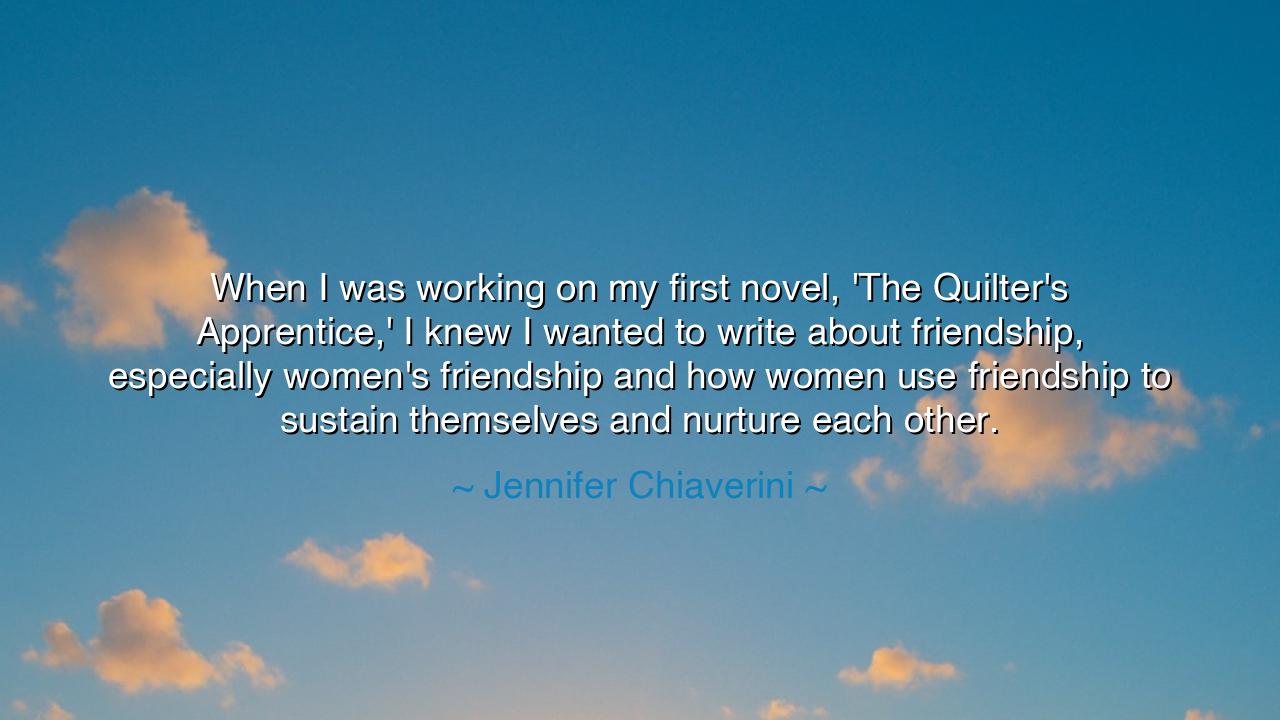
When I was working on my first novel, 'The Quilter's Apprentice,'
When I was working on my first novel, 'The Quilter's Apprentice,' I knew I wanted to write about friendship, especially women's friendship and how women use friendship to sustain themselves and nurture each other.






"When I was working on my first novel, 'The Quilter's Apprentice,' I knew I wanted to write about friendship, especially women's friendship and how women use friendship to sustain themselves and nurture each other." These words from Jennifer Chiaverini illuminate a profound and timeless truth about friendship, particularly women's friendship—a bond that not only serves as a source of support but as a nurturing force that helps women navigate the complexities of life. In a world that often challenges women in unique and profound ways, the friendships they form are not merely for companionship, but become vital lifelines that sustain, empower, and transform them. Chiaverini, through her writing, acknowledges that friendship is not just a passive connection, but an active and sacred bond that nurtures both the spirit and the soul.
In the ancient world, the value of friendship was seen not as a mere bond of shared enjoyment, but as a cornerstone for personal and social flourishing. The Greeks, particularly Aristotle, spoke of friendship as essential to living a virtuous life. For Aristotle, the most profound friendships were not merely based on pleasure or utility, but on a shared pursuit of goodness and virtue. These friendships were meant to nurture each other's moral development and help each other grow as individuals. In much the same way, Chiaverini suggests that women's friendships are not just about passing time together, but about mutually enriching one another's lives, offering nurturance and support in times of hardship, and empowering each other to flourish.
Consider the relationship between Socrates and his followers, particularly Plato. Socrates, despite his intellectual prowess, was not alone in his journey of discovery. He formed deep bonds with his disciples, challenging them not only in their intellectual pursuits but also in their personal lives. His friendships were based on a shared commitment to truth and virtue, which strengthened the moral fabric of those who walked beside him. Similarly, Chiaverini's depiction of women's friendships speaks to this kind of transformational bond—a relationship built not merely on shared moments, but on the deeper purpose of helping one another grow, heal, and thrive in a world that sometimes seeks to silence or diminish their voices.
In Chiaverini's novel, 'The Quilter's Apprentice', the depiction of women's friendships underscores the emotional depth and resilience that these bonds create. Women, through their friendships, share not only laughter and joy, but also sorrow, struggles, and the weight of life's burdens. Quilting, as an art form, becomes a metaphor for this process. Just as a quilt is made of many small, seemingly unrelated pieces that are sewn together to create a beautiful, cohesive whole, so too are women's friendships formed from individual lives that intertwine to provide strength and comfort. Each piece of fabric, like each friend, contributes something unique to the tapestry of support and care.
One of the most poignant examples of women's friendship in history comes from the suffragette movement. Figures like Susan B. Anthony and Elizabeth Cady Stanton forged a lifelong bond not only in their shared cause but in their unwavering support for each other during the often dangerous and difficult struggle for women’s rights. Their friendship was a force of resilience—they nurtured each other's spirits, and in doing so, they created a legacy that continues to empower women today. Their friendship went beyond mere collaboration; it was a shared vision, built on mutual respect and support, that became the driving force behind their collective efforts.
In Chiaverini’s view, women’s friendships are crucial for sustaining women through life’s most difficult moments. These bonds act as both a source of strength and a reflection of what women can achieve when they support one another. Whether it’s through shared experiences of grief, joy, or personal growth, these friendships help to fill the gaps that life can leave behind, offering both comfort and empowerment. Through nurturing each other, women are not only surviving—they are thriving. Chiaverini’s writing invites readers to recognize the power of these connections and to honor the women who have been a part of their own lives in this way.
The lesson here is clear: friendship, particularly among women, is a bond that has the power to transform lives. It is not just a connection, but a nurturing force that sustains and strengthens those involved. Whether we are navigating the challenges of career, family, or personal loss, friendship offers us the support we need to continue. Let us, then, cultivate these relationships with the same care and respect that Chiaverini advocates for in her writing. Let us seek friendships that are grounded in mutual empowerment, honesty, and support, knowing that through these bonds, we can create not just connections, but a community that helps us become the best versions of ourselves.
In our own lives, we must ask ourselves how we can be the kind of friend who nurtures, who offers support, and who helps others grow, just as the women in Chiaverini’s novels do. Whether through simple acts of kindness or in moments of deeper emotional need, let us build friendships that sustain and empower—not just for ourselves, but for those around us. May we remember that friendship, at its best, is a gift—one that enriches our lives and makes us stronger, not just as individuals, but as a collective.






AAdministratorAdministrator
Welcome, honored guests. Please leave a comment, we will respond soon